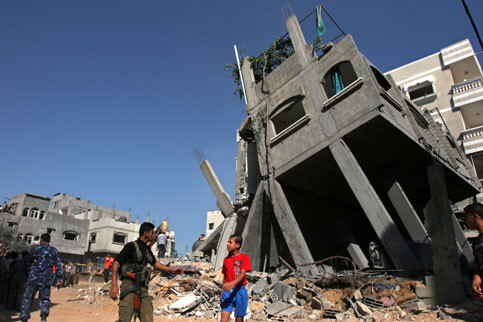United Nations News Service 14 July 2006

Palestinians check and search for survivors in a three-storey building that was brought down by an Israeli strike in Gaza City 12 July 2006. At least nine Palestinians were killed by an Israeli air strike targeting Hamas militant commanders in Gaza City on Wednesday. (MaanImages/Wesam Saleh)
United Nations humanitarian officials today urged Israel, the Palestinians and Lebanese Hizbollah militants to refrain from disproportionate responses in the current renewed fighting, avoid attacking civilians, end rocket attacks and release immediately all kidnapped people.*
“We fear a downward spiral to a totally uncontrollable situation,” UN Emergency Relief Coordinator Jan Egeland told reporters in Geneva, where he attended an international meeting on the social, economic, humanitarian needs of civilians in Gaza, describing that area as “a social crisis is becoming a humanitarian crisis.”
“The situation has never been worse in this past decade than it has been in the past few days,” he added of Gaza, where Israeli forces have carried out tank and air raids since Palestinians kidnapped an Israeli soldier, and Lebanon, where Israel launched widespread air, sea and land operations after Hezbollah crossed the line between the two countries, killing thee soldiers and seizing two more.
Mr. Egeland noted that the meeting had been called to prevent a collapse of all services to the Palestinians in Gaza and reminded participants of the UN’s revised appeal launched last month for $385 million for humanitarian needs in the occupied territories, of which only 31 per cent had materialized so far.
Israel’s disproportionate response led to the evolving Gaza crisis, he said. He called for an end to rocket attacks, which have rained down on Israel from Gaza and Lebanon, and for all those kidnapped to be released. After Palestinians from Gaza kidnapped a soldier, Israel seized dozens of Palestinians, mainly from the Hamas militant movement.
UN High Commissioner for Human Rights Louise Arbour underscored Secretary-General Kofi Annan’s condemnation of all actions that target civilians, or which unduly endanger them due to their disproportionate or indiscriminate character, spokesman Jose-Luis Diaz told a news briefing in Geneva.
She noted that while Israel has legitimate security concerns, international humanitarian law requires that parties to a conflict refrain from attacks directed against civilian objects. They have an obligation to exercise precaution and respect the proportionality principle in all military operations so as to prevent unnecessary civilian suffering.
The prohibition on targeting civilians is also being violated by Hizbollah, Mr. Diaz said. Ms. Arbour called on those detaining the Israeli soldiers to secure their immediate and safe release, adding that this would be instrumental in bringing the current crisis to a halt.
A UN-backed international women’s commission seeking Palestinian-Israeli Peace held an emergency meeting in Athens yesterday and called on the so-called diplomatic Quartet to intervene to end the fighting.
“Civilians, mainly women and children, are paying the price daily for this vicious cycle of retaliation and counter-retaliation. This is a time of great danger. Political collapse will lead to total loss of control, anarchy and chaos. If no action is taken today, tomorrow will be too late,” the International Women’s Commission for a Just and Sustainable Palestinian-Israeli Peace (IWC) said in a statement.
“We call upon the Quartet to dispatch high-level special envoys, including women, to mediate a truce and the exchange of prisoners, and to lead the parties back to political negotiations that address the root issues of the conflict. This is the last chance for sanity. This is the last chance for a two-State solution.”
The Quartet – the UN, European Union, Russia and the United States – are sponsoring the Road Map plan for a two-State solution, with both Israel and Palestine living side by side in peace
The IWC, an international body of Palestinian, Israeli, and other women, was set up in 2005 under the auspices of the UN Development Fund for Women (UNIFEM) in accordance with a Security Council resolution.
*Editor’s Note: The dictionary definition of the word “kidnap” necessitates that the abduction of a person is illegal. As the Israeli soldier was part of an occupying force, captured during a military raid against a military target, in international law he is considered to be a “prisoner of war”, not a kidnap victim. The rules governing the treatment of prisoners of war are spelled out in the third Geneva Convention of 1949, article 13 of which requires that POWs “must at all times be treated humanely”.
Related Links